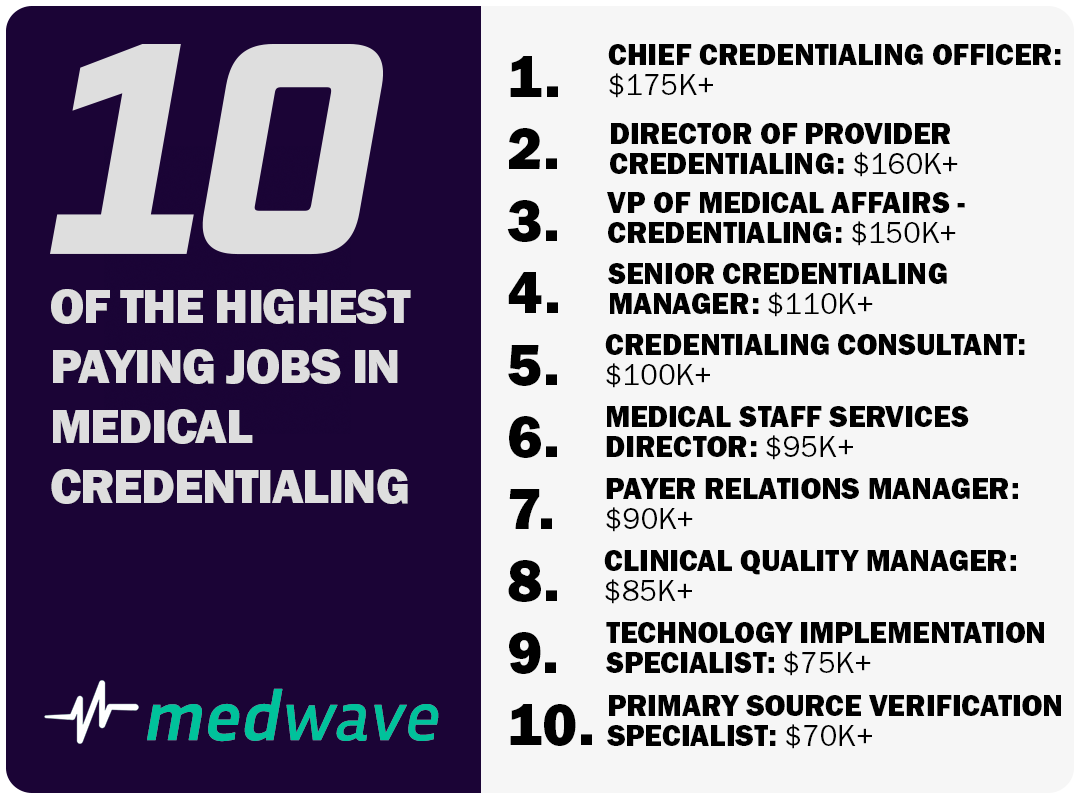Medical credentialing has emerged as one of the most lucrative and essential sectors within healthcare administration. With healthcare systems becoming increasingly complex and regulatory requirements more stringent, the demand for skilled credentialing professionals continues to grow exponentially. These specialists ensure that healthcare providers meet all necessary qualifications, maintain proper certifications, and comply with regulatory standards, making them indispensable to healthcare organizations nationwide.
The field offers exceptional career opportunities with competitive salaries that often exceed traditional administrative roles. From entry-level positions to executive leadership, medical credentialing professionals can build rewarding careers while contributing meaningfully to patient safety and healthcare quality. The following medical credentialing jobs represent the highest-paying opportunities in this dynamic field.

1. Chief Credentialing Officer
Salary Range: $150,000 – $250,000+
The Chief Credentialing Officer stands at the pinnacle of medical credentialing careers, overseeing entire credentialing departments across large healthcare systems or multi-facility organizations. These executives develop strategic credentialing policies, manage compliance across multiple locations, and serve as the primary liaison between credentialing departments and executive leadership.
Chief Credentialing Officers typically possess extensive experience in healthcare administration, advanced degrees in healthcare management or related fields, and comprehensive knowledge of regulatory requirements across multiple states. They lead teams of credentialing specialists, manage million-dollar budgets, and ensure that credentialing processes support organizational growth while maintaining the highest standards of compliance.
The role demands exceptional leadership skills, strategic thinking, and the ability to navigate complex regulatory environments. Many Chief Credentialing Officers also serve on hospital committees, participate in accreditation surveys, and represent their organizations at industry conferences and regulatory meetings.
2. Director of Provider Credentialing
Salary Range: $120,000 – $180,000
Directors of Provider Credentialing manage comprehensive credentialing programs for large healthcare organizations, overseeing the verification and monitoring of hundreds or thousands of healthcare providers. They develop departmental policies, supervise credentialing staff, and ensure compliance with Joint Commission standards, CMS requirements, and state regulations.
These professionals typically manage complex credentialing workflows, implement technology solutions to streamline processes, and collaborate closely with medical staff offices, human resources, and legal departments. They often hold advanced certifications such as the Certified Provider Credentialing Specialist (CPCS) or Certified Medical Staff Services Professional (CMSP) credentials.
Directors must possess strong analytical skills to identify process improvements, excellent communication abilities to work with diverse stakeholders, and detailed knowledge of credentialing standards across multiple specialties. They frequently serve as subject matter experts during accreditation surveys and regulatory audits.
3. Vice President of Medical Affairs – Credentialing
Salary Range: $140,000 – $220,000
This executive-level position combines clinical expertise with credentialing administration, typically requiring both medical background and extensive credentialing experience. Vice Presidents of Medical Affairs with credentialing focus oversee credentialing programs while also managing broader medical staff affairs, quality assurance initiatives, and regulatory compliance programs.
These professionals often possess medical degrees, advanced healthcare administration credentials, and years of experience in both clinical practice and healthcare administration. They work closely with chief medical officers, hospital administrators, and board members to ensure that credentialing practices support organizational goals while maintaining the highest standards of patient safety.
The role involves strategic planning, policy development, and oversight of multiple departments. Many professionals in this position also maintain clinical privileges and continue limited practice while managing administrative responsibilities.
4. Senior Credentialing Manager
Salary Range: $90,000 – $140,000
Senior Credentialing Managers oversee day-to-day credentialing operations for medium to large healthcare organizations, managing teams of credentialing specialists and coordinators. They ensure timely completion of initial credentialing, re-credentialing, and ongoing monitoring processes while maintaining compliance with all applicable standards.
These professionals typically possess several years of credentialing experience, advanced certifications, and strong project management skills. They often specialize in specific areas such as hospital-based credentialing, managed care contracting, or multi-state credentialing programs.
Senior Managers must excel at managing competing priorities, meeting strict deadlines, and maintaining accuracy in high-volume environments. They frequently serve as mentors to junior staff and may be responsible for training and development programs within their organizations.
5. Credentialing Consultant
Salary Range: $80,000 – $150,000+
Independent credentialing consultants command premium rates for their specialized expertise, often earning more than traditional employees while enjoying greater flexibility and variety in their work. These professionals provide credentialing services to multiple clients, including hospitals, physician groups, managed care organizations, and credentialing verification organizations.
Successful consultants typically possess extensive credentialing experience, advanced certifications, and established reputations within the industry. They may specialize in specific niches such as telemedicine credentialing, locum tenens verification, or complex multi-state credentialing projects.
The consulting model allows experienced professionals to leverage their expertise across multiple organizations while commanding higher hourly rates. Many consultants also provide training services, policy development, and interim management during organizational transitions.
6. Medical Staff Services Director
Salary Range: $85,000 – $130,000
Medical Staff Services Directors manage comprehensive medical staff affairs programs that include credentialing, privileging, and ongoing professional practice evaluation. These roles combine credentialing expertise with broader medical staff administration responsibilities, including committee management, peer review coordination, and regulatory compliance.
Directors in this role work closely with medical staff leadership, hospital administration, and department chairs to ensure smooth operations of medical staff processes. They typically possess extensive knowledge of medical staff bylaws, accreditation standards, and regulatory requirements.
The position requires excellent communication skills, attention to detail, and the ability to work with physicians and other healthcare providers across multiple specialties. Many professionals in this role also hold advanced degrees in healthcare administration or related fields.
7. Payer Relations Credentialing Manager
Salary Range: $75,000 – $120,000
Payer Relations Credentialing Managers specialize in managing provider enrollment and credentialing relationships with insurance companies, Medicare, Medicaid, and other third-party payers. These professionals ensure that healthcare providers maintain active participation in insurance networks and meet all payer-specific requirements.
The role requires detailed knowledge of payer credentialing requirements, contract management, and revenue cycle implications of credentialing delays. Managers must maintain relationships with multiple payer representatives and stay current with changing requirements across numerous insurance plans.
These positions often involve significant coordination with revenue cycle departments, as credentialing delays can directly impact an organization’s ability to bill for services. Strong analytical skills and attention to detail are essential for success in this specialized field.
8. Clinical Quality and Credentialing Manager
Salary Range: $80,000 – $125,000
This hybrid role combines credentialing expertise with clinical quality management responsibilities, appealing to professionals with both clinical backgrounds and credentialing experience. These managers oversee provider credentialing while also managing quality assurance programs, peer review processes, and performance improvement initiatives.
Professionals in this role typically possess clinical degrees, credentialing certifications, and quality management credentials. They work at the intersection of credentialing and quality, ensuring that credentialed providers meet not only regulatory requirements but also organizational quality standards.
The position involves data analysis, trend identification, and collaboration with clinical departments to address quality concerns. Many professionals in this role also participate in accreditation surveys and regulatory audits related to both credentialing and quality programs.
9. Technology Implementation Specialist – Credentialing
Salary Range: $70,000 – $115,000
As healthcare organizations increasingly adopt sophisticated credentialing software systems, specialists who can bridge the gap between technology and credentialing processes command premium salaries. These professionals manage implementation of credentialing information systems, workflow optimization, and integration with other healthcare technology platforms.
The role requires both credentialing expertise and technical skills, including understanding of database management, workflow design, and system integration. Specialists work closely with IT departments, vendors, and end users to ensure successful technology implementations.
These positions are becoming increasingly valuable as organizations seek to automate credentialing processes, improve efficiency, and enhance data analytics capabilities. Many professionals in this field also provide ongoing system support and training services.
10. Senior Primary Source Verification Specialist
Salary Range: $60,000 – $95,000
While entry-level verification positions offer modest salaries, senior specialists with extensive experience and specialized knowledge can earn significantly higher compensation. These professionals handle the most complex verification cases, serve as subject matter experts, and often supervise teams of verification staff.
Senior specialists typically possess years of experience, advanced certifications, and detailed knowledge of verification requirements across multiple specialties and jurisdictions. They may specialize in areas such as international credential verification, complex disciplinary history research, or verification for specialized provider types.
The role involves mentoring junior staff, handling escalated cases, and maintaining relationships with verification sources. Many senior specialists also contribute to policy development and serve as internal experts during audits and surveys.
Career Advancement and Professional Development
Success in medical credentialing requires continuous learning and professional development. Industry certifications such as the Certified Provider Credentialing Specialist (CPCS), Certified Medical Staff Services Professional (CMSP), and Certified Verification of Healthcare Providers (CVHP) credentials significantly enhance earning potential and career advancement opportunities.
Professional organizations like the National Association Medical Staff Services (NAMSS), Healthcare Financial Management Association (HFMA), and American Organization of Nurse Executives (AONE) provide networking opportunities, continuing education, and career development resources essential for advancement in this field.
Summary: The Top 10 Highest Paying Medical Credentialing Jobs
Medical credentialing offers exceptional career opportunities with competitive salaries and strong growth potential. The demand for skilled credentialing professionals will continue to grow with healthcare continuing to dynamically change and regulatory requirements becoming more complex. Whether pursuing traditional employment or consulting opportunities, professionals with credentialing expertise can build rewarding careers while contributing meaningfully to healthcare quality and patient safety.
The field rewards expertise, attention to detail, and commitment to continuous learning. With proper education, certification, and experience, credentialing professionals can achieve significant financial success while playing a crucial role in the healthcare system’s integrity and effectiveness.

